The reason I began making lists of Movies to Watch After… was for films like The Kid Who Would Be King. Writer/director Joe Cornish is among this generation of filmmakers who are so heavily influenced by earlier movies that their own output is literally a mashup of what came before. The Kid Who Would Be King is technically an original feature, yet it doesn’t exist without centuries-old legends firstly and decades-old movies secondly. Even two of its young breakout stars, Louis Ashbourne Serkis and Angus Imrie, are the descendants of respected British actors.
Below is a selection of 11 movies, going back chronologically, that form the ingredients of The Kid Who Would Be King, some of them explicitly acknowledged as such by Cornish.
HyperNormalisation (2016)

Let’s begin with this week’s documentary pick. There’s a context to The Kid Who Would Be King that the world is all kinds of terrible right now. Not only is this a way to explain why a new King Arthur is needed today but it also appears to be Cornish’s simple reaction specifically to the current divide in the UK. For an apt nonfiction title, I wanted to recommend a documentary about Brexit but had to ask around on Twitter for one to watch myself. Apparently, because the story isn’t yet over, there isn’t really anything out there. Not particularly focused just on Brexit, anyway.
As an alternative to something more focused, I’ve chosen HyperNormalisation, a nearly three-hour documentary feature from Adam Curtis and the BBC. This profound (counter-) historical essay film goes back more than 40 years to explain how the situation the world is in today — including the election of Donald Trump in the US (which hadn’t even happened with the doc premiered) and the vote for Brexit (which had only happened a couple months before it aired) — is the result of events begun back in 1975 — coincidentally the year of The Kid Who Would Be King‘s namesake. There’s a lot going on in HyperNoramalisation but the main thesis argues that we’ve long given up on the real world and accepted a “fake world,” meaning we don’t even need The Matrix to come true since humanity already exists in a sort of sleepwalking surface-level analog Matrix anyway.
Attack the Block (2011)
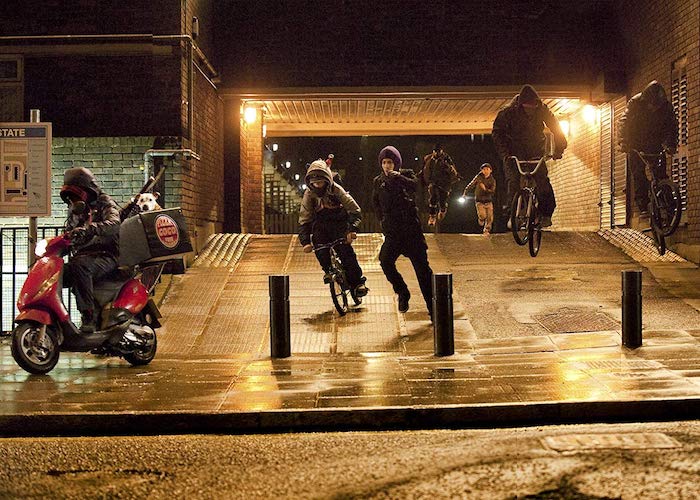
So much has happened since Cornish made his debut feature with Attack the Block. And I’m not just still talking about current events. Breakout star John Boyega has become a movie icon thanks to his major role in Star Wars, and lead actress Jodie Whittaker is now best known as the first woman to play the iconic titular character on Doctor Who. Yet only now, after eight years, has Cornish delivered a sophomore directorial effort. Kids going to see The Kid Who Would Be King (including my own older child) weren’t even conceived of, let alone born when Attack the Block was released.
Cornish continually states that Attack the Block is a movie for teenagers, while The Kid Who Would Be King is for younger viewers and their parents. Of course, anyone who appreciates good movies should enjoy both all the same (not that I’m ready to show Attack the Block to my son). And they both are easily labeled that terrible shorthand descriptor “Amblinesque” because each involves a bunch of kids at the center of a fantastical and somewhat frightening adventure where they have to save the world. In the new movie, the threat is an evil dragon lady. Here’s it’s nasty ape-like aliens with glowing teeth.
Son of Rambow (2007)
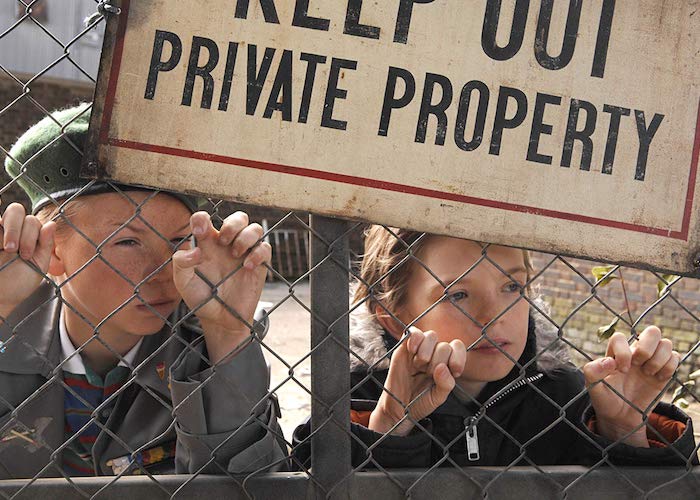
We don’t have to go all the way back to the 1980s and the “Amblinesque” to find The Kid Who Would Be King‘s antecedents. For the past decade plus, the British have been making terrific family films that are even better than the two nostalgic favorites that will come next on this list. There are the Paddington movies, for example, and this ensemble coming-of-age comedy from the former music video production team of Hammer & Tongs — aka director Garth Jennings and producer Nick Goldsmith, who’d previously made the underrated Hitchhiker’s Guide to the Galaxy adaptation for Disney. It even features a cameo from regular Cornish collaborator Edgar Wright.
Son of Rambow is about young outcast schoolboys, not unlike the duo of Alex and Bedders in The Kid Who Would Be King, except the two here, along with their own additional recruits from school, come together to make a movie (their own version of Rambo: First Blood Part II), not become modern-day version of King Arthur and the Knights of the Roundtable for a mission to save the world. One of the main duo is even fatherless. There’s no quest or adventure beyond their imaginations and what they produce locally for the camera, this whole movie is grounded in reality, but there’s a shared feeling between Son of Rambow and Cornish’s new movie. Maybe it’s that they both have political contexts, with this film being set during Thatcher-era Britain. Also, Imrie’s young Merlin is the most fabulous school transfer since Jules Sitruk’s French exchange student here.
Explorers (1985) and The Goonies (1985)
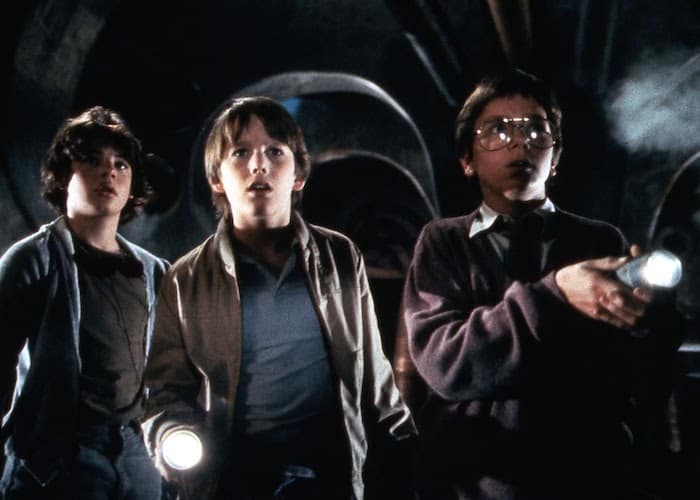
Two of the movies that people mean when they say “Amblinesque” are Joe Dante’s Explorers, which wasn’t produced by Amblin, and Richard Donner’s The Goonies, which was made by the company with direct involvement from Steven Spielberg. Both from 1985, both following a group of outcast boys in an adventure that takes them away from home. The Goonies is probably more like The Kid Who Would Be King, despite its lack of fantastical elements (if we ignore the usually deleted octopus bit), because it deals with a vintage legend that the main kid obsesses on and loops in some older reluctant kids. But the stakes in The Goonies are simpler, though the kids saving their own homes might as well be, in their minds, saving the whole world.
Explorers is science fiction, features a much smaller group of kids, and as exciting and entertaining as the first half is, with those kids building a ship and launching themselves out into space, the second half kind of falls apart. It comes to a standstill, mainly because of how expository the script becomes and how cartoony (Looney Tunes-esque, obviously, since it’s Dante) the aliens are in contrast with the otherwise grounded tone of the kid stuff. There’s never any real conflict or stakes, unfortunately, but at least the young Ethan Hawke and River Phoenix are appealing throughout. If only Spielberg, who’d produced Dante’s previous film, was involved.
Explorers, not The Goonies, is the preferred one of these two 1985 kids-adventure movies for Cornish. Or, it’s at least the one that inspired his new film. He told Entertainment Weekly regarding its influence:
“I met Joe Dante one time and told him how much I loved it, and he looked really annoyed, and said, ‘Oh, they took that film away from me, they released it before it was finished.’ It’s funny when a film you love is not loved by the director. It’s a very simple, pure story, very uncomplicated, with again a really crazy combination of very grounded characters, and then a fantasy plot, and the design of the aliens is really out there at the end. And it’s got a fantastic twist that I won’t spoil for anybody that hasn’t seen it.”
Excalibur (1981) and E.T. the Extra-Terrestrial (1982)
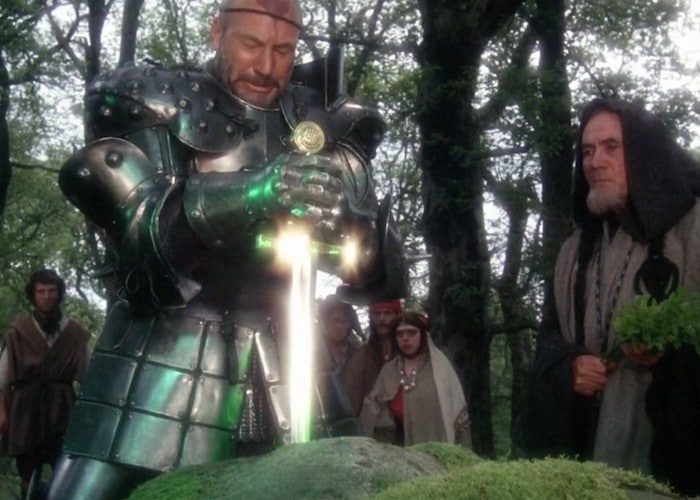
Here are two more movies that Cornish acknowledges as influences in that Entertainment Weekly article. And many other spots. In fact, more than other inspirations, he is quoted in many interviews saying The Kid Who Would Be King is essentially a mashup of John Boorman’s King Arthur movie Excalibur — which also co-stars a young Patrick Stewart — and Spielberg’s classic E.T. the Extra-Terrestrial. They’re very different films that were released just over a year apart, but they came at a very impressionable time in Cornish’s life and have been among his favorites ever since. As dissimilar as they are on their own, though, The Kid Who Would Be King proves they go well together in a cinematic mixture. Cornish told Mike Ryan at Uproxx:
“It actually comes from when I was 13, so many years ago, when I saw ‘E.T.’ for the first time. And I was a similar age to Henry Thomas, the kid in ‘E.T.’ And that film, like many people, had a massive effect on me as a kid. And then the same year I saw ‘Excalibur,’ John Boorman’s ‘Excalibur.’ And it’s an amazing film, obviously. It’s set in such a fantastic weird past, but it feels futuristic. It feels like science fiction and it’s so gory, and baroque, and sexy, and mystical. Anyway, so the two had a big effect on me, ‘E.T.’ and ‘Excalibur.’ And when I was a kid I was always thinking of ideas for movies and painting little fake movie posters and stuff. And this was one of my ideas: to make a movie about a normal kid like Henry Thomas, like Elliot in ‘E.T.,’ who instead of finding an alien found the sword in the stone.”
Time Bandits (1981)
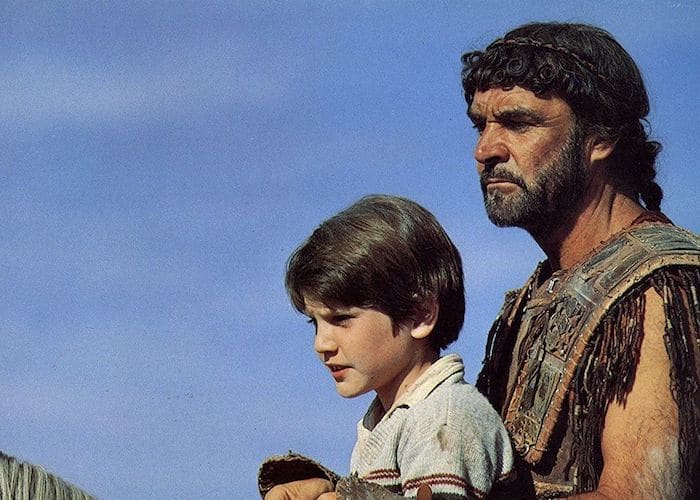
Terry Gilliam’s Time Bandits is the movie I most thought fondly back to while watching The Kid Who Would Be King, and I’m glad to see that Cornish is also namechecking it in interviews. You’ve got a regular kid traveling far from home — spatially and temporally — and going up against a purely evil entity with a group of new friends. I’ve recommended it a lot on these lists over the years, even more than I’ve recommended Son of Rambow, so I’ll let him do the praising here. First, check out his humorous conversation with Mike Ryan about it, particularly the ending (spoiler alert, I guess), and then here’s what he said of the movie more focally, acknowledging Gilliam’s Monty Python background, in the Entertainment Weekly article:
“A pretty rare thing. It was a British fantasy-adventure movie. It’s obviously Python-esque but it’s not pure Python. It’s not as completely silly as the Python movies. It has a kid at its center, and it has real jeopardy, and a very brilliant villain that David Warner plays, and a tremendous cameo by Sean Connery, which I thought of when I thought about casting Sir Patrick Stewart as the older Merlin.”
It’s surprising that King Arthur isn’t among the mythological and historical figures included in Time Bandits, although Gilliam and the Python troupe had already hilariously tackled the tales of Arthur, the Knights of the Roundtable, and Camelot (that silly place) with 1975’s Monty Python and the Holy Grail, which he co-directed. Then again, he also returned to the Arthurian stuff with my favorite of his movies, 1989’s The Fisher King, and like The Kid Who Would Be King, that one is set in the present but heavily references the old legends.
The Man Who Would Be King (1975)
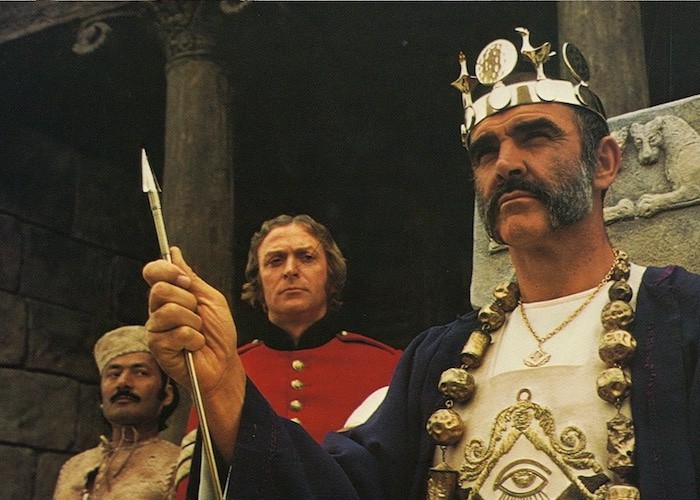
Speaking of Sean Connery, here’s another movie that inspired The Kid Who Would Be King. Well, its title inspired Cornish’s title. The Man Who Would Be King sounds like an Arthurian movie, and maybe I thought it was when I was younger, but it has nothing to do with those legends or anything else you’d presume (nope, not a Shakespearean thing either, young Campbell). Unless, of course, you know your Rudyard Kipling. His 1888 story is adapted here by director John Huston with Connery and Michael Caine as former British soldiers who travel to Kafiristan, where the former is mistaken for a god and also declared king. It’s a great movie of its time made from a great story of its time, and I hope nobody ever thinks of remaking it.
The Sword in the Stone (1963)
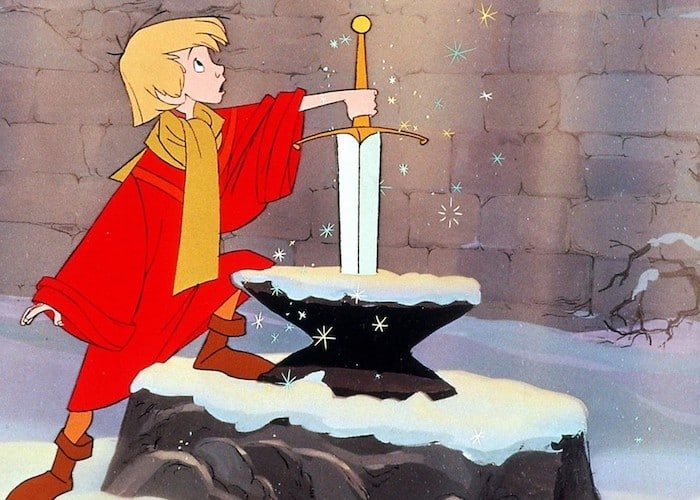
The Kid Who Would Be King honors the Arthurian tradition, at least from Robert de Boron’s medieval poem Merlin on, of a young boy pulling the sword Excalibur from a stone, proving his divinity. Disney’s animated adaptation of the first story in T.H. White’s The Once and Future King series portrays him a bit younger than his usually attributed age of 15. But that certainly makes the story more appealing to a young audience. There’s no better gateway for children to be introduced to King Arthur before or after they see Cornish’s movie than a cartoon feature about a little boy and his magical adventures that serve as a lead-in to the rest of the legends. You can follow it later with 1975’s not-so-young King Arthur, the Young Warlord.
Many have and will compare The Kid Who Would Be King to the Harry Potter stories and movies, but Disney had us covered earlier with their version of the original tales of a chosen child and the old wizard who mentors him. Even the owl, another Potter staple, is present in The Sword in the Stone, though here he’s a separate creature from Merlin rather than his alternate form. And the animated feature is very funny, too, especially during a sequence where Merlin, Arthur, and the villain Madam Mim are transforming into other animals. Disney has, of course, begun plans for a live-action remake of The Sword in the Stone, which will be released on the streaming service Disney+, in case you aren’t a fan of the studio’s scratchy ’60s animation.
A Connecticut Yankee in King Arthur’s Court (1949)

Mark Twain’s novel A Connecticut Yankee in King Arthur’s Court is a bit of a reverse of The Kid Who Would Be King. Instead of Merlin and Morgana showing up in the present and clashing with modern-day characters, the story follows a modern-day protagonist who travels back in time to the time of Arthur and Camelot. There are many adaptations of the book to choose from, starting with the 1921 silent version and the first musical take for the big screen starring Will Rogers in 1931, but this one with Bing Crosby is the most traditionally favored. The story, which originally owed a lot to Sir Thomas Malory’s retellings of the Arthur legends in Le Morte d’Arthur, also involves a solar eclipse but for a different purpose than the one in Cornish’s film.
For the kids who aren’t ready for the pace of a 70-year-old Crosby vehicle, there are other more youth-friendly takes on the Twain novel. The most accessible and beloved is Disney’s A Kid in King Arthur’s Court, which young baseball fans will enjoy (especially if they’ve seen Rookie of the Year). There’s also the same studio’s forgotten late ’70s adaptation Unidentified Flying Oddball, which features the same actor (Ron Moody) as Merlin, as well as an animated short from Disney starring Goofy called A Knight for a Day, which is the Twain story but not specifically Arthur’s time as the medieval destination. Bugs Bunny also got his own version with 1978’s A Connecticut Rabbit in King Arthur’s Court. Finally, if you (or your kids) still prefer animation, there’s a feature-length made-for-TV cartoon adaptation from 1970 with a very Hanna-Barbera-like style.
The post Watch ‘The Kid Who Would Be King,’ Then Watch These Movies appeared first on Film School Rejects.

0 comments:
Post a Comment